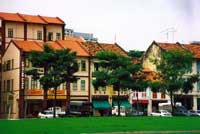 Synchronicity is a strange thing. One recent bandh morning, I found myself discussing the merits and demerits of Singapore with someone who thought the island state's style of governance held lessons for Nepal. The next weekend, I was walking through Changi Airport on an unexpected and unplanned foray southeast, towards the equator.
Synchronicity is a strange thing. One recent bandh morning, I found myself discussing the merits and demerits of Singapore with someone who thought the island state's style of governance held lessons for Nepal. The next weekend, I was walking through Changi Airport on an unexpected and unplanned foray southeast, towards the equator. The sheer efficiency and comfort of the airport alone is enough to sway most Asia-weary westerners. My temporary travelling companion was a medical veteran of the United Mission to Nepal, on his way back home after a trip to Kathmandu. He told me that he always flew home through Changi because "the alternative is Delhi and that's no alternative at all." I pointed out that while Changi was certainly a good taste of Singapore, Indira Gandhi International was by no means representative of Delhi. But he wouldn't be swayed.
Out into the gentle streets of eastern Singapore, the taxi driver friendly and-yes-efficient, suggesting tourist activities and recommending restaurants. No, I don't think his brother had any hospitality business interests. At my midrange hotel, a sign read "no tipping please, our staff are well paid to look after you". In the shops, bazaars and endless restaurants, everything is immaculate, reasonably priced and of superb quality. Food is a glorious thing in Singapore, eating many times a day is a local obsession. You never see a local drunk although there are bars and evidence of beer culture everywhere. Public transport is among the best in the world and the authorities wisely try to restrict the use of cars through swingeing fees for daytime use of the city streets. It is often too hot or wet to walk very far but surely only California has more air conditioning units per capita.
Of course, much that was colourful, exotic and interesting has disappeared from Singapore. Bugis street, once home to Asia's craziest transvestite scene, is now an ersatz Chinese village-cum-shopping mall. The lush green parkland is surrounded by flowing traffic as local affluence easily overcomes the cost of driving. Arab Street, Little India, Chinatown and other neighbourhoods are architecturally present but have a feel of theme park about them, tourists outnumbering residents; restaurants and boutique hotels everywhere. New buildings are almost all Chicago style glass-steel towers. The tropical colonialist ethic of tile roofs and pillared verandas is still there, but dwarfed by brash skyscrapers.
As for local politics, benign authoritarianism overlaid with democratic symbols rules the day. Only 24 opposition candidates ran for 84 parliamentary seats in the last election. Few succeeded. Some dissidents have been sent to prison in the past, according to international human rights group. A cosy elite of business people and highly skilled bureaucrats run the economy, yet few Singaporeans are bothered. This is why so many working with governance issues in Asia wonder if former Prime Minister Lee wasn't right when he spoke of Asian ways, Asian values, Asian versions of democracy.
Put simply, Singaporeans are proud of their status as a fully developed country-fifth in per capita income, ahead of Canada, Sweden and Australia. They're proud of their airline, easily one of the world's best, and their diverse economy based on hard work, education and brain power. Singapore is smaller than all but four Nepali districts and its three million people are almost entirely refugees and immigrants-the hardest-working people in the world.
Where then are the lessons for Nepal? The two countries share a continent-Asia. Both also had turbulent births as modern states, Nepal in 1950-51 and Singapore later in the 50s and 60s. Big neighbours lurk over the horizon in both lands although Singapore's economic success keeps it punching above its weight with Malaysia and Indonesia. In the end, I wonder if that's the only real thing of note for Nepal about the Lion City. Size doesn't matter, or can be mitigated, if you make a success of yourself. The price of failure, by contrast, is devastating, and believe me, they're aware of that in Singapore.
The advantages of geography, a refugee population and relative political unity are simply not to be downplayed by those in search of a magic formula for Nepal.



